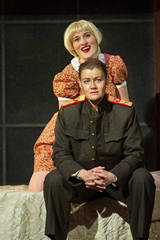| Opera Reviews | 5 May 2024 |
ETO continues its Venetian theme with The Coronation of Poppeaby Catriona Graham |
|
| Monteverdi: The Coronation of Poppea English Touring Opera Malvern October 2013 |
|
|
Samal Blak's two-storey set keeps Poppea's bed at the centre of attention throughout, and gives scope for related action to be seen in parallel. There is clever use of wall-panels, shoved round to open out or enclose the bed, to change the emphasis. Overall, it creates the claustrophobic atmosphere in which the story unfolds. Costumes place it firmly in the Stalinist era, emphasising the arbitrary nature of totalitarian power. The Prologue sets up the moral dilemma, opening with three Young Pioneers unfurling their respective banners of Fortuna, Virtu and Amor - a rather camp Jake Arditti - and each setting out the case for its supremacy. Paula Sides is a young Poppea, with her teddy-bear still by her bed. She spends most of her time in bed, either with Nerone or just resting - she is, after all, pregnant. She is flattered by Nerone's attention and ambitious for the power that goes with it. When Nerone is at last free to make her his wife, Arnalta the nurse (an outstandingly expressive John-Colyn Gyeantey) gleefully sings of the power, which will, in turn, accrue, to her. Although Helen Sherman's performance as Nerone never quite fools the audience that she is a man, the love duets with Poppea are rich and fervent. Their final duet 'Pur ti miro, pur ti godo,' when Poppea realises, with emerging fear, that the one person Nerone really loves is himself, is very moving. Ottavia (Hannah Pedley), Nerone's spurned wife, is stretching it a bit in claiming to be without fault when she is sent into exile, but she sings her aria of farewell to her homeland beautifully and expressively. At the moral heart of the piece is Seneca (Piotr Lempa), philosopher and tutor to Nerone and the only low voice in the opera. His principled refusal to condone unjust action can lead only to his death by suicide - effected in silhouette against a window. He raises his hands, and blood pours down the glass from his wrists. At the end of the opera, the exiles are similarly seen in silhouette. Drusilla (Hannah Sandison) and Ottone (Michal Czerniawski) are not without fault either, but they don't deserve their exile. Sandison' brisk ironing of her Young Pioneer scarf while singing how her heart is dancing (in Anne Ridler's translation, as edited and amended by director James Conway) is deliciously done. She comes over as a much more straightforward character than the conniving Poppea. Czerniawski's heartfelt laments for his lost Poppea, and his subsequent transfer of affection to Drusilla are persuasive. The Old Street Band, conducted by Michael Rosewell, brings out the rich textures in the music and complements the singing, not least the many languorous 'blue' notes. |
|
| Text ©
Catriona Graham Photo © Richard Hubert Smith |

 Ottone is a bit down. Here he is, back from battle, and there is the
Emperor, in bed with Ottone's mistress, while two bodyguards snooze
outside. Monteverdi's late opera The Coronation of Poppea is
the earliest of the three Venetian operas in English Touring Opera's
autumn season and, in ways, the most challenging.
Ottone is a bit down. Here he is, back from battle, and there is the
Emperor, in bed with Ottone's mistress, while two bodyguards snooze
outside. Monteverdi's late opera The Coronation of Poppea is
the earliest of the three Venetian operas in English Touring Opera's
autumn season and, in ways, the most challenging. 





